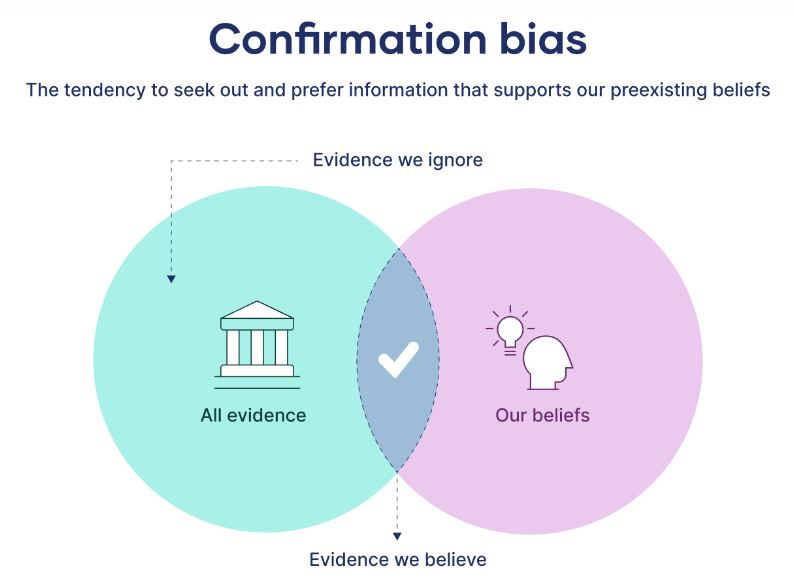Bias and closed-mindedness.
Where and how awareness of your bias and limitations can come in handy?
Opinion is a dark matter. It seems that it appears on the basis of some logical arguments. However, if you look closely, it may turn out that even before these arguments appear, our mind serves a certain choice that has already been made.
That is, the choice of an opinion has already been made (quickly and subconsciously), and the mind is looking for arguments that make the already chosen opinion justified. Ignoring other arguments that contradict the chosen opinion.
Simply put, the choice is made in a like-dislike construct at a subconscious level, and the intellectual component of the mind then engages in what is called “confirmation bias,” which is considered a cognitive bias.
/For the purpose of this text we narrow the broader term “bias” down to “confirmation bias” only/.
Here's what Erich Fromm wrote on this topic.
A person can only accept those arguments which are already in harmony with one’s character, whereas those which bring about doubt or critical remarks will be disregarded or distorted in the direction of strengthening previously formed character traits."
(Fromm, E. Escape from Freedom. New York: Henry Holt and Company, LLC, 1994. p. 261.)
*
This phenomenon has been studied by several psychologists and philosophers, including Erich Fromm. In the scientific literature, it is known as “confirmation bias”.
Confirmatory bias is a person's tendency to seek, interpret, and prefer information that confirms one's existing beliefs, and to ignore or distort information that contradicts those beliefs.
The concept of confirmational bias is widely used in psychological research and is associated with many aspects of human behavior, including decision making, risk assessment, and belief formation.
Confirmation bias (also known as “confirmation bias” or “myside bias” in English literature) is a cognitive distortion in which people tend to seek, interpret and remember information in a way that confirms their existing beliefs or hypotheses.
This phenomenon is characterized by the following aspects:
Selective information seeking: People tend to find evidence that supports their opinion, while ignoring contradictory evidence.
Interpretation bias: New information is interpreted in favor of existing beliefs, even though it might be interpreted differently.
Memory bias: People remember better and are more likely to recall information that confirms their views.
Confirmation bias can lead to the formation and reinforcement of false beliefs and poor decision making. It makes it difficult to objectively assess a situation and can create “echo chambers” where people only surround themselves with information that matches their opinion.
In the scientific community, confirmation bias can manifest itself in the choice of research methods, interpretation of results, and even in the peer review process of scientific papers. This can lead to scientific distortion and slow progress in certain areas of knowledge.
Recognizing the existence of confirmation bias and actively striving for objectivity and critical thinking can help reduce its influence on decision-making and belief formation.
*
Next, I continue to share a selection of quotes from Fromm on the subject.
- “There are two types of freedom - freedom from external coercion and freedom from the internal tyrannical voice. The inner voice is what makes a person blind and deaf to those arguments that question one’s beliefs” (from the book “Flight from Freedom”) .
- “We find only what we are looking for, and we find only what we already know” (from the book “The Art of Loving”).
- “We all live in our own isolation, locked in the circle of our own interests and thoughts” (from the book “Escape from Freedom”).
- “We accept only those facts that correspond to our beliefs, and ignore those that contradict these beliefs” (from the book “The Art of Loving”).
- “Each person creates one’s own picture of the world based on one’s beliefs, desires and fears, and this picture of the world affects how a person perceives and evaluates information” (from the book “Escape from Freedom”).
*
Interestingly, this fits well with so called Eastern knowledge. For example, Sadhguru explicitly says that the intellectual function of the "buddhi" mind serves the identification of self-identity made by the "ahamkara" function of the mind.
*
Now let's talk about limitations. Bias is already cutting the ground from under the feet of the so-called reasoned opinion. If you look closely, every argument hides behind itself a certain identification and preference.
But even if you look at “pure” argumentation, it is always local and always focused on the vision of the bearer.
What impresses me is to what extent does an ordinary person vehemently defend this opinion. This is where it's interesting to explore.
Energetically this is understandable. The brain cannot process all kinds of combinations of reasoning, and the gestalt is open and this is pain, so as a result, usually, the reasoning slides and collapses into that same confirmation bias, but with the appearance as if it is an unclouded source of truth.
*
For those who have read this far (I doubt that this happened, I myself was interrupted more than once to finish this text) - I offer a very simple game. Give examples from life when you were confident that you were right, but as time passed it became clear to what extent it was... biased.
*
Why is that so? One of the threads is the doctrine of the dominant in relation to how our brain works. When one or another dominant “gains power” (read, develops) - it suppresses the rest to such an extent that the rest cannot interfere. This is why “a smart thought comes later”, and “the evil has confused me”, and much more.
This is why meditation doesn’t help, at least not right away. It is required to grow a new alternative character trait, capable of quickly making decisions and taking responsibility instead of the old, proven “autobahns” of the nervous system - ancient structures. It’s like a competition between a drop of water and a river, if I’m caricaturing it for clarity. It is necessary to dig a new riverbed, and do it correctly, and then straighten those sections of the old river where congestion has accumulated.
That's why even the wisest sage (I'm being ironic) can still lose one’s temper. Where it is thin, it can break through. And personal growth is one continuous subtlety.
What then, no need to grow? Here everyone decides for themselves. In my opinion, it is necessary to grow. But you need to do this taking into account your bias and your limitations.
*
Now I propose to look at it from the following point of view. In ordinary life, situations often occur when everything happens quickly and what happens causes strong emotions. One of the reasons for the emergence of emotions is the very speed of what is happening, there is no opportunity to think, no time, no condition, no resource. In such situations it is difficult to remain aware, rather impossible - at least without preparation.
But somehow we get through these situations and move on.
Who made the decisions in these situations? If you look honestly, soberly, and impartially, it may turn out that decisions were made from some other level of yourself, subconsciously, automatically, so quickly that sometimes you won’t even remember the details of what happened, not even mentioning to take a conscious decision.
Those same dominants take over. Awareness, conscious mind is only one of the functions, and in any sufficiently stressful situation, more powerful subconscious functions take control. There's not much you can do about it.
But this can be taken into account, comprehended, and strategies and tactics can be developed in this regard. If we honestly admit that everyone has bias, by default, if this becomes part of normal culture, then in any dialogue all its participants could consciously take into account their bias and their limitations.
At the same time, you can look at your limitations differently. In my opinion, formulating this only as cognitive distortions, without thinking about the bigger picture, is a dangerous practice. This can be used by people not for its intended purpose, but as a moral cudgel, they say, look, you have a cognitive distortion, and now I’ll tell you how to live. And why is such a narrator more conscious? It is important not to create an idol, including not creating an idol out of knowledge of cognitive distortions.
I see the point in thinking about the evolutionary role of bias, the evolutionary role of dominant brain function. Nothing in nature appears just like that. Under stress, under time pressure, you need to act somehow, but there is no time to think carefully weighing and considering what to do. If you get hung up on complex thoughts, you can fall under the principle of “delay is like death.”
From this point of view, bias provides certain advantages: the ability to act, decisive action, mental stability, the ability to unite in a group to solve common problems. That same confidence in one’s rightness, even if this rightness is three times wrong, makes it possible to act, and to act decisively, while maintaining stability, focus on the goal, on achieving results.
Later it may turn out that the result is not pleasing, and the goal was not the right one, and so the person again rushes somewhere, like that homing missile, to pursue an elusive target. But if you slow down the rocket too much, it will simply fall, the rocket has speed limits, and the human psyche also has limitations.
Realizing these limitations, realizing that the psyche almost needs to be biased in order to maintain the necessary, so to speak, “flight speed”, or, say, “stability in aiming at the target,” you can evaluate both yourself and the dialogue completely differently, starting with an awareness of one’s own bias and limitations, and keeping this awareness in front of you throughout the dialogue. It's not easy, but it can be learned, cultivated in oneself.
However, such a culture seems to be suitable only for those willing to voluntarily find a mutually beneficial solution through dialogue?
So the question remains open: who may be willing to voluntarily find win-win solutions through dialogue, using a culture of awareness of their own biases and limitations?
Looking pragmatically, the situation usually influences more than the setting on a mutually attentive dialogue that takes into account the interests of both parties. In what cases will people desire such dialogue, and in what cases will they close themselves off from it?



